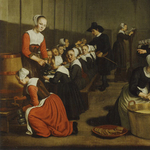The Dutch Republic as a Bourgeois Society
DOI:
https://doi.org/10.18352/bmgn-lchr.7117Keywords:
Citizenship, Dutch RepublicAbstract
Historians have often portrayed the Dutch Republic as the first ‘bourgeois’ society. What they had in mind was an early example of a society dominated by the sort of middle class that emerged in most other European countries after the French and Industrial Revolutions. In this article, ‘bourgeois’ is perceived in a slightly different way. By looking at the ‘bourgeois’ as ‘citizens’ – often, but not necessarily, middle class in a social sense – the article paints a picture of a plethora of blossoming urban civic institutions. Such civic institutions also existed in other European countries. What set the Dutch Republic apart, however, and indeed made it an early example of a ‘bourgeois’ society, was the dominance of these civic institutions in the Republic’s socio-political life.
This article is part of the special issue 'The International Relevance of Dutch History'.
Downloads

Downloads
Published
Issue
Section
License
Authors who publish with this journal agree to the following terms:
a) Authors retain copyright and grant the journal right of first publication with the work simultaneously licensed under a Creative Commons Attribution 4.0 International (CC BY 4.0) that allows others to share the work with an acknowledgement of the work's authorship and initial publication in this journal.
b) Authors are able to enter into separate, additional contractual arrangements for the non-exclusive distribution of the journal's published version of the work (e.g., post it to an institutional repository or publish it in a book), with an acknowledgement of its initial publication in this journal.
c) Authors are permitted to post their work online (e.g., in institutional repositories or on their website) prior to and during the submission process.
Authors are explicitly encouraged to deposit their published article in their institutional repository.








